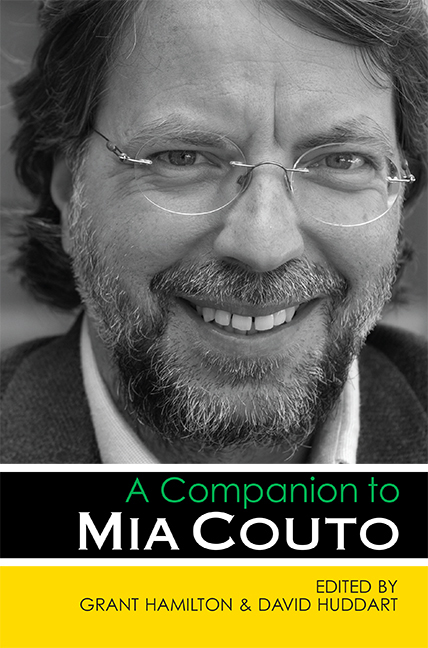Book contents
- Frontmatter
- Dedication
- Contents
- Acknowledgements
- Notes on Contributors
- Introduction
- An Interview with Mia Couto
- 1 Mia Couto in Context
- 2 Uma coisa fraterna Mia Couto & the Mutumbela Gogo Theater Group
- 3 Reading Raiz de orvalho Counterpointing Literary Genres in the Work of Mia Couto
- 4 Spaces of Magic Mia Couto’s Relational Practices
- 5 Mia Couto or the Art of Storytelling
- 6 The Multiple Worlds of Mia Couto
- 7 ‘Ask Life’ Animism & the Metaphysical Detective
- 8 Mia Couto & Translation
- 9 Jesusalém Empty Fathers & Women’s Texts
- 10 Trauma Repetition & Pure Repetition in The Tuner of Silences
- 11 Seeing Like a Crocodile Bird Mia Couto’s The Last Flight of the Flamingo
- 12 Mia Couto & Nostalgia Reading The Last Flight of the Flamingo
- 13 Mia Couto, Contexts & Issues A Bibliographic Essay
- Bibliography
- Index
4 - Spaces of Magic Mia Couto’s Relational Practices
Published online by Cambridge University Press: 22 May 2021
- Frontmatter
- Dedication
- Contents
- Acknowledgements
- Notes on Contributors
- Introduction
- An Interview with Mia Couto
- 1 Mia Couto in Context
- 2 Uma coisa fraterna Mia Couto & the Mutumbela Gogo Theater Group
- 3 Reading Raiz de orvalho Counterpointing Literary Genres in the Work of Mia Couto
- 4 Spaces of Magic Mia Couto’s Relational Practices
- 5 Mia Couto or the Art of Storytelling
- 6 The Multiple Worlds of Mia Couto
- 7 ‘Ask Life’ Animism & the Metaphysical Detective
- 8 Mia Couto & Translation
- 9 Jesusalém Empty Fathers & Women’s Texts
- 10 Trauma Repetition & Pure Repetition in The Tuner of Silences
- 11 Seeing Like a Crocodile Bird Mia Couto’s The Last Flight of the Flamingo
- 12 Mia Couto & Nostalgia Reading The Last Flight of the Flamingo
- 13 Mia Couto, Contexts & Issues A Bibliographic Essay
- Bibliography
- Index
Summary
The window: isn't that the place where the house dreams of becoming the world? – Mia Couto, Estorias abensonhadas
What moves me is the divine vocation of the word, which not only names but invents and produces enchantment. – Mia Couto, E se Obama fosse africano?
Mia Couto brings magic and wholeness to a world that is dissected, shattered, divided – a world that suffers from a profound loss of enchantment. This loss of enchantment, brought about in Europe around the sixteenth century imposed on African communities during colonization, upholds and believes first and foremost in the rational scientific paradigm. This paradigm anthropomorphizes the world and presents humans and human reason as capable of attaining objective truth and knowledge about the self, the world and the cosmos. It is a system that thinks itself capable of bringing about the development of the world and the human being, leading to human happiness, realization and overall progress. Within such a hierarchizing (and arrogant and self-indulgent) modus operandi, the object is gazed at by the human mind and incorporated into the self. As Senegalese writer and politician Léopold Senghor puts it when discussing what he terms the European personality vs. the African personality,
He [the European] first distinguishes the object from himself. He keeps it at a distance. He freezes it out of time and, in a way, out of space. He fixes it, he kills it. With his precision instruments he dissects it in a pitiless factual analysis. As a scientist, yet at the same time prompted by practical considerations, the European makes use of the Other that he has killed in this way for his practical ends. He makes a means of it. With a centripetal movement he assimilates it. He destroys it by devouring it. ‘White men are cannibals,’ an old sage from my own country told me a few years ago. ‘They have no respect for life.’ (1965, 29)
Like Senghor, Mia Couto writes against this European worldview by presenting the individual as always yearning to connect with the other (the human) or the otherness (the non-human, the transcendental) in order to exit the individual self – because to be closed in oneself hurts, and in fact prevents the self from fulfilling its ontological relational destiny, a destiny that demands a connection with the non-self, an entrance into a whole that is out there and of which the self is a part.
- Type
- Chapter
- Information
- A Companion to Mia Couto , pp. 64 - 85Publisher: Boydell & BrewerPrint publication year: 2016



